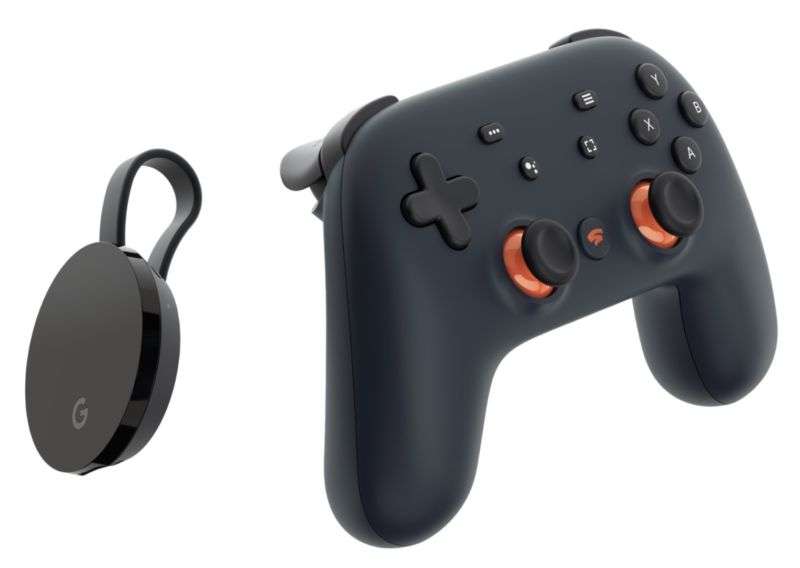
Google Stadia in 4K might push you past your home-Internet data cap

Google Stadia will bring 4K game streaming to customers in November, but the new service could be costly for users who face home-Internet data caps and want to play games at the highest possible settings.
Google says you’ll need 35Mbps to play at maximum settings—that’s 4K resolution, high dynamic range (HDR), and 60 frames per second (fps) with 5.1 surround sound. As PC Gamer noted last week, that adds up to 15.75GB per hour, which would use up an entire 1TB monthly data allotment in 65 hours of game time.
Stadia will work at lower resolutions, with Google recommending 20Mbps for 1080p/60fps with 5.1 surround sound, and 10Mbps for 720p/60fps with stereo sound. That’s 9GB and 4.5GB per hour, respectively, potentially using up a 1TB data cap in 114 or 228 hours.
But Stadia’s actual data usage may end up being lower on average than the Google-supplied numbers. Netflix, for example, recommends a 25Mbps connection for 4K video even though its videos generally stream at about 15Mbps. Netflix’s recommendation accounts for the actual 4K stream plus a cushion to take care of your other Internet needs. Movies and TV are generally 24fps or 30fps instead of the 60fps that Google aims to deliver with Stadia game streaming.
We asked Google if 35Mbps is the actual amount that will be used by Stadia for 4K games or if that includes some extra bandwidth, but the company did not give us a clear answer. “They are recommended speeds” is all Google would tell us.
We also asked Google if it will provide options for disabling 4K to reduce data use. The company told us that Stadia “will have a tool to help gamers monitor and manage data usage.”
Stadia data needs
At its November launch, Stadia will cost $129.99 up front and $9.99 a month, in addition to individual game purchase costs. Later on, there will a paid subscription tier that doesn’t require the upfront purchase and a free tier that’s limited to 1080p.
There are reasons think that Stadia’s bandwidth requirements could vary quite a bit. For example, if a player’s character and objects on the screen move at extremely fast speeds, a game will use more data than it would at calmer moments when elements on the screen are mostly unchanging.
Video games might also have bigger data-usage spikes than movies or TV. For games, it will be more difficult to buffer content than it is with TV and movies because the game player’s actions determine what’s shown on screen next. It’s possible that 35Mbps will be what’s needed for peak data rates, with typical rates being less than that. Advances in streaming technology could also help control game-streaming data usage.
Watch out for data caps
Still, Stadia’s listed bandwidth requirements suggest it will require more data than 4K video, and this is something Internet users should consider if they face data caps. Karl Bode’s Vice story, “Google Stadia will reveal how stupid Internet data caps are,” is worth reading on this topic.
Comcast enforces a 1TB monthly cap throughout much of its US territory, and it charges an extra $10 for each additional block of 50GB, or $50 extra a month for unlimited data. AT&T, Cox, and other home Internet providers impose similar limits, though some major ISPs such as Verizon FiOS and Charter don’t charge data overage fees.
Comcast says its customers use a median of over 200GB a month, and industry research suggests that more than 4 percent of US cable customers use at least 1TB.
Monthly data caps accomplish little to nothing when it comes to managing network congestion, because what matters most with network congestion is heavy usage by many customers at specific, peak times, not each person’s total monthly usage. Still, limiting overall use may help ISPs delay capital upgrades, and the artificial scarcity created by data caps can be used by ISPs to their own financial advantage.
Most obviously, ISPs get more money when customers have to pay data overage charges or pay extra for unlimited data. But ISPs could also create their own game streaming services and exempt them from data caps while enforcing the caps when customers use rival gaming services. That would give customers a financial incentive to buy streaming services directly from their Internet providers instead of from different companies, even if the other companies’ services are better.
ISPs could also charge game-streaming companies for data-cap exemptions as part of zero-rating programs. The Obama-era Federal Communications Commission found that this kind of scheme violated the FCC’s net neutrality rules when AT&T and Verizon exempted their own video services from mobile data caps while charging other companies for the same data-cap exemptions.
But the Trump-era FCC quickly reversed this finding and later eliminated the net neutrality rules entirely. If ISPs throw up any roadblocks to game-streaming services, the current FCC leadership isn’t likely to do anything about it.





